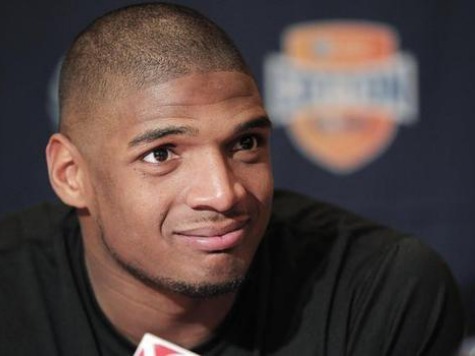Last year, Missouri defensive lineman Michael Sam announced that he was gay to his teammates. In an interview with The New York Times on Sunday, he publicly announced his sexual orientation to the general public. “I looked in their eyes,” Sam related of his coming-out, “and they just started shaking their heads – like, finally, he came out.” Sam was a first-team all-American and the Associated Press defensive player of the year in the Southeastern Conference. Sam stated, “I just want to make sure I could tell my story the way I want to tell it. I just want to own my truth.” He added, “I’m not naïve. I know this is a huge deal, and I know how important this is. But my role as of right now is to train for the combine and play in the NFL.”
The Times hailed Sam’s announcement as a possible breakthrough for gay rights, even as the United States openly protested Russia’s anti-gay laws at the Olympics, the federal government moved to recognize gay marriage by expanding legal benefits and services, and 33 years after Martina Navratilova came out. The Times stated:
As the pace of the gay rights movement has accelerated in recent years, the sports industry has changed relatively little for men, with no publicly gay athletes in the N.F.L., the N.B.A., the N.H.L. or Major League Baseball. Against this backdrop, Mr. Sam could become a symbol for the country’s gay rights movement or a flash point in a football culture war — or both.
According to the Times, scouts asked Sam’s agent whether he had a girlfriend during a game last year. Intolerance, the Times implied, is rife.
Sam’s statement has been hailed as an act of bravery by the media in the same way that former NBA fringe player Jason Collins’ coming out was last year; in that case, the President of the United States felt the necessity to congratulate Collins. Collins attended the State of the Union Address in the Obamas’ box this year. But Sam’s action is significantly braver than Collins’. He faces presumed risk, whereas Collins came out after his career was essentially over (he had been cut by the abysmal Washington Wizards).
The biggest problem for Americans, however, is that there can be no victory for tolerance in this scenario. Americans who are apathetic about Sam’s sexuality – people who believe that he will (and should) be accepted without regard to his sexuality — will be castigated as unfeeling simply for stating those views. The media needs Sam’s coming out to be a big deal, because that is how they can continue to portray America as a nasty place in need of leftist cultural and governmental correctives.
The media continually portray America as a place deeply riven by anti-gay bigotry, despite the fact that anti-gay attacks are at historic lows, and high-profile acceptance of open homosexuals is at all-time highs. There’s a reason for that: antipathy for Judeo-Christian views means insisting that those who believe in those views are intolerant buffoons. Someone must be the villain in this morality play.
And that means that Sam must be portrayed as a victim, no matter how things go at the draft. Assume for a moment that Sam, who is projected to go in the third round, goes in the third round: there will be many who claim that he should have gone higher, and that the NFL just wasn’t ready for a gay player. Assume that he goes in the first round: the media will claim he was a potential first round pick anyway, or claim that it’s too early to tell if the NFL is ready for him.
Now assume what will probably happen: he will go in the fourth round or later. Teams, put off by the potential for the publicity surrounding Sam’s sexuality to disrupt team chemistry, decide to look at other prospects. Each team, recognizing that it will not be individually blamed for overlooking Sam, passes on Sam – and the NFL is then collectively blamed for homophobia. That is the media’s dream: they hope that Sam’s draft stock drops so they can blame America’s brutal hatred for gays, even though it is the very publicity the media ginned up that could play a role in that stock dropping in the first place.
And when Sam is finally selected, there will be no celebration of that fact. The media will not accept a Branch Rickey, even if we consider Sam a Jackie Robinson figure. Instead, the media will quote anonymous scouts who wonder about Sam’s sexuality. They will quote anonymous league insiders who question whether Sam can fit in in the locker room. They will cite to a vague institutional bias against homosexuals, and imply that those who think homosexual acts are sinful seek to treat those like Sam poorly.
That’s because if Sam’s acceptance into the league goes smoothly, the left loses its talking point. Conservatives cannot be made the victimizers if there is no victim. So the media has pre-emptively declared Sam a victim — despite the evidence, which suggests that Sam was widely accepted by teammates at Missouri. Those who believe that America has moved beyond such issues are told that they are intolerant simply for suggesting an American transformation that has clearly taken place. And if, despite the media’s worst intentions, Sam is drafted, performs well, and is paid and treated accordingly, the media will simply move on to their next chosen victimhood group, their next “milestone.” And they will continue to portray America as a dirty, rotten, nasty place. Which, of course, is the point.
Ben Shapiro is Senior Editor-At-Large of Breitbart News and author of the New York Times bestseller “Bullies: How the Left’s Culture of Fear and Intimidation Silences America” (Threshold Editions, January 8, 2013). He is also Editor-in-Chief of TruthRevolt.org. Follow Ben Shapiro on Twitter @benshapiro.

COMMENTS
Please let us know if you're having issues with commenting.